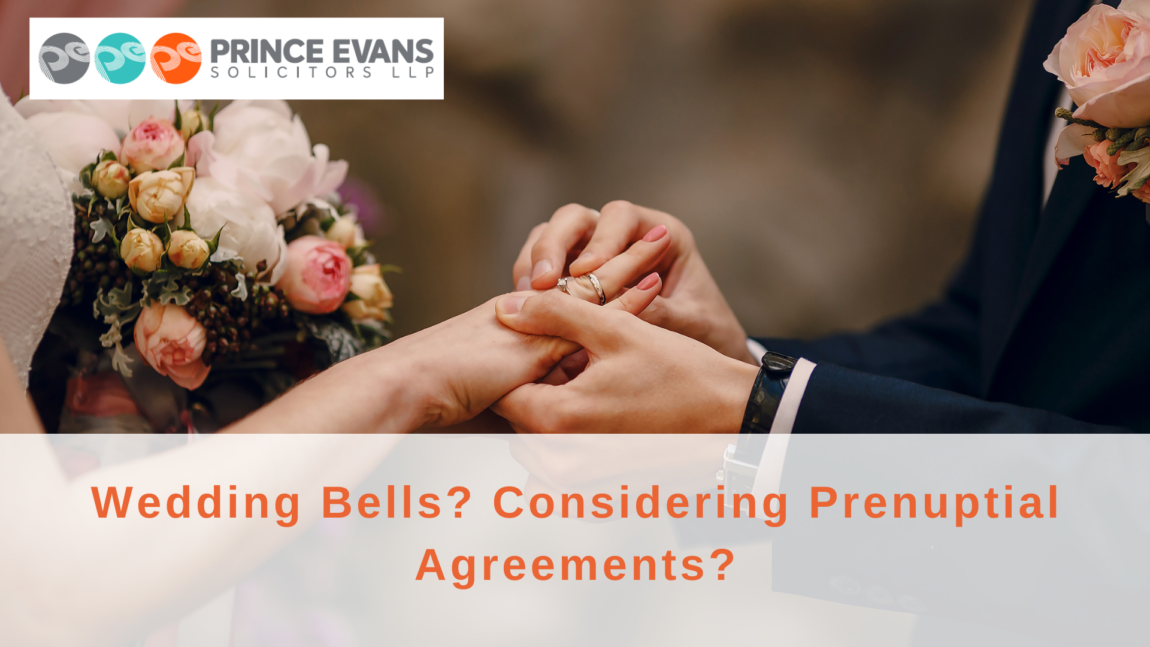
Wedding Bells? Considering Prenuptial Agreements?
With the covid restrictions now being lifted couples are now in full steam ahead with their much awaited wedding plans with family and friends.
However, asking your fiancé/fiancée in the lead up to your wedding whether they will agree to a pre-nuptial agreement setting out what would happen if you ever divorce can admittedly seem very unromantic. It can also be initially seen as an unnecessary additional expense when, as we all know, weddings themselves can be expensive!
Nonetheless, 1 in 4 couples marrying currently now have a pre-nuptial agreement in place to protect assets they are bringing into a marriage, whether that be businesses, properties, savings or other assets.
You may have inherited or been gifted money to put into a property from your family to protect and hopefully keep out of the equation in any future divorce.
Alternatively you may be marrying later in life or this may be your second marriage where you want to protect assets you have built up either for yourself or for your children from a previous marriage to eventually inherit.
In short, the peace of mind a pre-nuptial agreement gives you is invaluable and could potentially save you thousands of pounds and months of negotiating if you do divorce.
As every couple has different circumstances, the details of an agreement will be unique. However our solicitors at Prince Evans can discuss your individual case with you and likely scenarios to protect and ring-fence your assets so they are not lost on divorce. You could decide for example that you and your spouse will only take out of the marriage what you brought into it and divide any jointly owned assets you go on to own equally.
Pre-nuptial agreements can also safeguard future inheritances or gifts to allow family members to make provision without worrying about these sums being lost in a divorce.
They also offer financial security if you have a higher earning capacity, you will be giving up work to raise a family or to protect you from having to pay anything towards your partner’s debts. Agreements can even include ownership of artwork or pets.
Whilst pre-nuptial agreements are not yet currently fully legally binding in England and Wales, they are still persuasive on the Court and one of the circumstances to take into account. This is particularly the case if you have both disclosed your financial circumstances, had legal advice and the terms of the agreement are deemed to be fair. The agreements will also say that if the law changes and they become legally binding and enforceable, you will both sign documentation to achieve this.
Without such an agreement, and if you are unable to negotiate a settlement with your spouse and have to go to Court, you will be leaving it to a Judge to decide what is ‘fair and reasonable’ in all the circumstances, having regard to a list of factors known as the Section 25 factors. This is therefore subjective and dependent on what the individual Judge deems appropriate. They have a wide discretion. Assets you have acquired pre-marriage will then normally be classed as matrimonial assets available for distribution as the Judge sees fit. This may result in you losing hard earned assets or past inheritances to your spouse purely through lack of having a pre-nuptial agreement in place.
An agreement now therefore allows you both to decide what is right for you as a couple rather than an order bring imposed on you which you may never have anticipated and which you would consider is far from being ‘fair and reasonable’.
It can also often be easier and much less expensive in terms of legal fees, to negotiate with your partner now what will happen if you divorced, than trying to do so years down the line when your relationship has unfortunately soured.
As such in many cases, setting out your intentions in a pre-nuptial agreement prior to marriage shouldn’t be viewed as being unduly pessimistic but instead a reasonable and responsible step you make together to create greater certainty for you both and also for wider family members whilst avoiding the risk of future acrimony. In short it is a win-win situation!
It is advisable that you sign the agreement at least 4 weeks before your wedding day.
If you do not have this amount of time before the wedding or if you are already married but want to agree with your spouse what would happen if you divorced, you can enter into a post nuptial agreement instead at any time after you are married. This may be even more effective than a pre-nuptial agreement
We at Prince Evans can advise you on how best to either draft a pre-nuptial or post-nuptial agreement on your behalf or alternatively advise on an agreement which you may have received from your partner/their solicitors. We offer fixed fees for this advice where possible.
To find out more, call us today on 020 8280 2710
